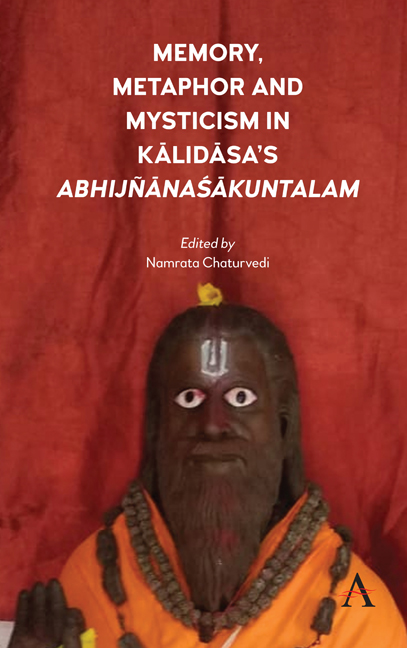Chapter 2 - What Happens in Śakuntalā: Conceptual and FormalSymmetries
Published online by Cambridge University Press: 23 February 2022
Summary
The Problem with Śakuntalā
As virtually every Western account of Kālidāsa'sŚakuntalā eagerly,and by now tiresomely, recounts, Europe's initialacquaintance with the play (through Jones's Englishversion of 1789 and subsequent translations) wasaccompanied by extraordinary excitement and effusiveadmiration. Goethe, to cite only the most celebratedcase, was fascinated by the work and wrote verses inits praise that have been quoted ever since. Nor wasthis a mere passing interest of his. He meditatedlong on Kālidāsa's masterpiece, and only some thirtyyears after his first exposure to the work did hefinally determine what it was that had so impressedhim:
Das erstemal, as ich dieses unergründliche Werkgewahr wurde, erregte es in mir einen solchenEnthusiasmus, zog mich dergestalt an, dass ich eszu studieren nicht unterliess […] Ich begreifeerst jetzt den überschwenglichen Eindruck, dendieses Werk früher auf mich gewann. Hier erscheintuns der Dichter in seiner höchsten Funktion alsRepräsentant des natürlichsten Zustandes, derfeinsten Lebensweise, des reinsten sittlichenbestrebens, der würdigsten Majestät und derernstesten Gottesbetrachtung.
And elsewhere he remarks on the ‘Weibliche Reinheit,schuldlose Nachgiebigkeit, Vergesslickeit desMannes, mütterliche Abgesondertheit, Vater undMutter durch den Sohn vereint, dieallernatürlichsten Zustände, hier aber in dieRegionen der Wunder, die zwischen Himmel und Erdewie fruchtbare Wolken schweben, poetisch erhöht undein ganz gewöhnliches Naturschauspiel durch Götterund Götterkinder aufgeführt’.
It might prove more worthwhile to investigate Goethe'sreaction to Śakuntalāfrom the vantage point of ‘Orientalism’ (in Said'ssense) than to enquire whether it is in fact analtogether valid literary judgement. But it is thelatter question I am interested in here, for it isas a literary judgement that his assessment hasexercised its principal influence. Goethearticulated, and so valorized, the set of aestheticand ideological categories to which nearly allcritical attention to the work has been restrictedever since. We never cease to hear of Kālidāsa'sbrilliant representation of the most naturalconditions of existence, his refined vision of humanlife, the exquisitely pure morality and earnestreligiosity that inform his work.
- Type
- Chapter
- Information
- Publisher: Anthem PressPrint publication year: 2020



